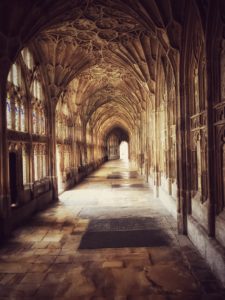Complex Organizations, Complicated People
 Years ago, President Powers at UT Austin was invited to speak to a group of people who supported the various ministry groups located around campus – ministers, rabbis and imams. The Provost and I were invited to attend and, unexpectedly, we were asked if we wanted to speak. Difficult to say no in those circumstances. I don’t remember what my colleague spoke about, but I found myself saying that people often think that the university stands opposite the practice of religion, but that I thought they had more in common than we acknowledge.
Years ago, President Powers at UT Austin was invited to speak to a group of people who supported the various ministry groups located around campus – ministers, rabbis and imams. The Provost and I were invited to attend and, unexpectedly, we were asked if we wanted to speak. Difficult to say no in those circumstances. I don’t remember what my colleague spoke about, but I found myself saying that people often think that the university stands opposite the practice of religion, but that I thought they had more in common than we acknowledge.
There are the ways that the modern university links back to the medieval church. We share titles – provosts, deans, and chancellors. We share robes and vestments – all of which were designed for a colder environment than many of us experience when we wear them at convocation or commencement. We share a perspective of time that is often different from the world around us. Take cathedrals for example. The craftsmen who began work on a new cathedral weren’t alive to see it completed. The people who put the finishing touches on the building are literally standing on the work of the people who came before them. The same is true for universities.
During those unprepared remarks, I said I thought the most important similarity between communities of faith and colleges and universities is that both are involved in asking really big questions. The method of investigating and searching out answers to those questions are different, but the questions are big and complex and important.
But there’s another similarity too. Both types of organizations are complex organizations in themselves and they are part of an ever larger network of complex ideas and relationships. And they are filled with, administered by (that’s another shared word ad-minister), and important to a wide variety of people – not all of whom agree on what they should be doing and how they should do it.
I was reminded of this experience today as I was thinking about so many organizations trying to negotiate all the effects, implications, and complications created by our shared experiences of the pandemic. As I read stories about the arguments and disruptions happening on airplanes and in stores and restaurants, I know that campuses will be experiencing similar complex interactions in the coming weeks and months.
One of the touchstones of the work of the Center for Courage and Renewal is “when things get rough, turn to wonder.” I’ve always liked that idea. What if instead of being certain we know the answers to the questions people will be asking as we return to sharing campus spaces, what if we turn to wonder? What if we wonder what experiences, ideas, questions or certainties brought them and us to this tough point? What if we are willing to ponder big questions in our day-to-day work not only in classrooms and labs? What different answers might we find if we are willing to engage with the complexity facing us instead of seeking the so-called quick and simple answer?
Our complex organizations are filled with complicated people – why wouldn’t the questions and answers be equally complicated? Let’s wonder.
Take care,
Gage
